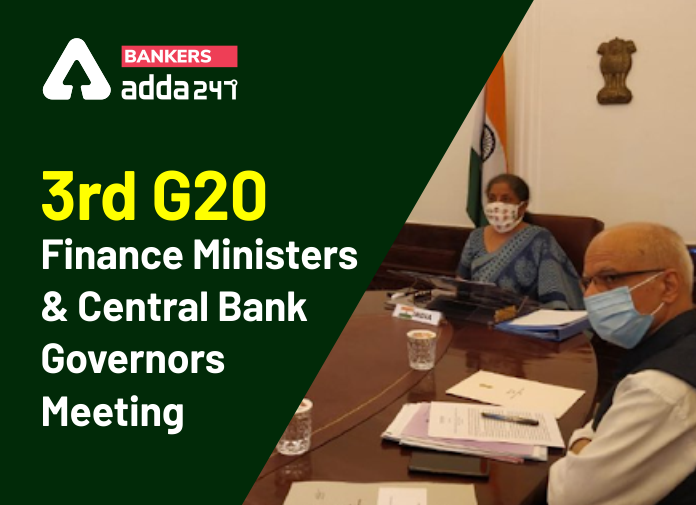Table of Contents
The 3rd G20 Finance Ministers and Central Bank Governors (FMCBG) meeting was held under the Saudi Arabian Presidency through Video Conferencing. India was represented by Union Minister for Finance & Corporate Affairs Nirmala Sitharaman in the meeting. During the meet, the participants deliberated on the global economic outlook amid evolving COVID-19 pandemic crisis along with other G20 Finance Track priorities for the year 2020.
Also Check
G20 Action Plan:
- The importance and relevance of the G20 action plan was highlighted.
- It was endorsed in response to Covid-19 in April 2020.
- It has a list of collective commitments under the pillars of Health Response, Economic Response, Strong and Sustainable Recovery and International Financial Coordination, aimed at coordinating G20 efforts to fight the pandemic.
- FMCBG discussed the developments on G20 Finance Track deliverables under the Saudi Arabian Presidency.
Also Check
- Uttarakhand releases report on conservation of endemic, threatened floras
- International Day for the Fight against Illegal, Unreported and Unregulated Fishing: 5 June
India’s Response:
- During the Finance Ministers and Central Bank Governors meet, Nirmala Sitharaman highlighted the measures taken by India to fight the COVID-19 pandemic such as direct benefit transfers, special support to agriculture and MSME sectors, rural employment guarantee measures etc.
- India emphasised the need to balance supply side and demand side measures in response to Covid-19.
- It also spoke about the procyclicality of credit rating downgrades by the rating agencies and its deterrent impact on policy options, particularly for Emerging Market Economy (EMEs).
- Procyclic ratings are stricter during an economic downturn than an expansion. As a result, firms receive overly pessimistic ratings in a recession, relative to during an expansion.
- International coordination required in addressing the spill-over effects of exit strategies related to covid-19 lockdowns.
- Spillover effect refers to the impact of unrelated events in one nation on the economies of other nations.
India discussed two such deliverables:
- First, Enhancing access to opportunities for Women, Youth and Small Market Economies (SMEs) and a menu of policy options on access to opportunity.
- Second, International Taxation agenda and the intended deliverable of formulating a solution for addressing challenges related to digital taxation.
Also Check
- MOHUA announced results of Star rating of garbage-free cities
- HIV Vaccine Awareness Day
- 45th India Ideas Summit 2020
About G-20:
- The G20 is an informal group of 19 countries and the European Union, with representatives of the International Monetary Fund and the World Bank.
- The G20 membership comprises a mix of the world’s largest advanced and emerging economies, representing about two-thirds of the world’s population, 85% of global gross domestic product, 80% of global investment and over 75% of global trade.
Origin of G-20:
- 1997-1999 Asian Financial Crisis: This was a ministerial-level forum which emerged after G7 invited both developed and developing economies. The finance ministers and central bank governors began meeting in 1999.
- Amid the 2008 Financial Crisis the world saw the need for a new consensus-building at the highest political level. It was decided that the G20 leaders would begin meeting once annually.
Members - The members of the G20 are Argentina, Australia, Brazil, Canada, China, France, Germany, India, Indonesia, Italy, Japan, Republic of Korea, Mexico, Russia, Saudi Arabia, South Africa, Turkey, the United Kingdom, the United States, and the European Union.
- One nation holds the chair every year, known as the ‘G20 Presidency’. Saudia Arabia is holding the 2020 chair.
- The 2021 summit will be held in Italy.
Also Check
Click Here to Register for Bank Exams 2020 Preparation Material
Visit Achieversadda.com and participate in discussions with other aspirants and achievers. Get answers to your queries and connect with others on Achieversadda.com




 Adda247 Launched the Coaching with Degre...
Adda247 Launched the Coaching with Degre...
 Financial Regulators In India
Financial Regulators In India
 What is the Monthly Salary of Bank PO?
What is the Monthly Salary of Bank PO?


